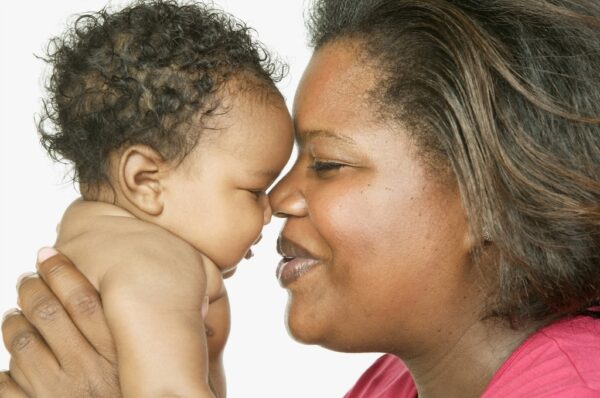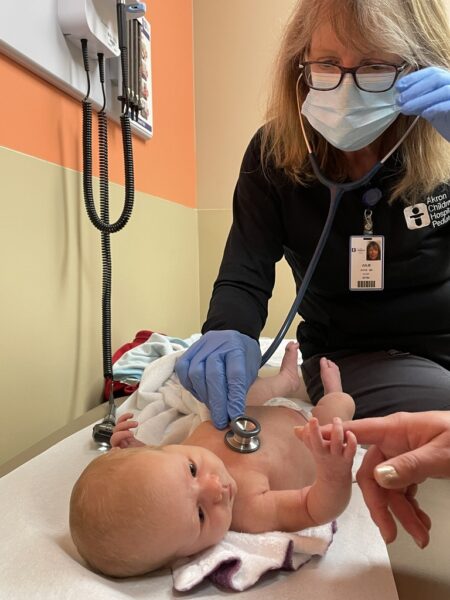
Bringing a baby into the world can bring joy, but during a global pandemic, it can also bring a lot of questions. Long-time pediatrician, Arthur Lavin, MD, FAAP, of Akron Children’s Pediatrics, Beachwood, breaks down new parents’ most pressing questions to help calm fears and ease worries.
Is my baby’s development on track?
Every person follows their own unique timing and specific course of development so there isn’t just one track for every baby. The best way to determine if your baby’s development is on pace is to come in for regular checkups so your provider can track growth, weight and head circumference, as well as keep up with vaccines. Be sure to talk with your child’s provider about anything concerning. Most of the time it’s nothing, but it’s always best to discuss things you notice or are concerned about because it allows your provider to keep tabs on it, too. Don’t be embarrassed to ask questions. We’re here to help.

Arthur Lavin, MD, FAAP, is a pediatrician at Akron Children’s Pediatrics, Beachwood where he cares for kids age newborn to 21.
Do you think my baby is autistic?
Diagnosing autism spectrum disorder (ASD), the current term for autism, can be difficult since there is no medical test, like a blood test, to diagnose the disorders. ASD can sometimes be detected at 18 months or younger, but more reliably around age 2. However, many children do not receive a final diagnosis until much older.
Regular checkups with a provider are important because it allows us to look at a child’s behavior and development over time. The cause(s) of autism is unknown, but genetics, differences in brain anatomy and toxic substances in the environment are thought to contribute to children developing the condition. There is no connection between vaccines and autism.

The CDC’s Autism and Developmental Disabilities Monitoring (ADDM) Network estimates that about 1 in 44 children are identified with ASD. By monitoring, screening, evaluating and diagnosing children for ASD, they can receive the support needed to reach their full potential.
Is my baby growing at a normal pace?
Every parent feels dread or panic if their baby isn’t tracking typically on a growth chart. They worry if they’re giving their baby what they need in terms of food, nutrients and sleep. It is helpful for parents to know, right from the start, that kids grow at their own pace and there is a wide range of healthy shapes and sizes among them. Genetics, gender, nutrition, physical activity, health problems, environment and hormones all play a role in a child’s height and weight. And many of these things can vary widely from family to family. Girls, boys and children with certain conditions such as Down syndrome or prematurity, are measured on different growth charts because they grow in different patterns and at different rates. With this in mind, providers track your child’s growth patterns (and weight) to make sure they’re progressing at their unique pace.

Julie Joyce, MD, FAAP gives a new baby wellness exam at Akron Children’s Pediatrics, Wooster.
How do I protect my baby from COVID-19?
You can protect your little one by avoiding large crowds and keeping a safe distance (at least 6 feet) from other people when out of the house. It’s also important for parents and anyone in your household who can get a COVID-19 vaccine to do so. Fully vaccinated now means 3 shots for adults and teens 12 and older. Masking a baby is never okay, but parents and caregivers should mask to help minimize exposure to COVID-19 and other illnesses. Wash your hands well and often, and teach others in your home to do the same.
Should my baby get all the typical newborn vaccines?
Yes. Parents should stay on track with their child’s vaccines by following the recommended immunization schedules, even during a pandemic. Babies are born with protection against some diseases because their mothers pass antibodies to them before birth and breastfed babies continue to get some in breast milk. But, in both cases, the protection is temporary.
Vaccination is a way to create immunity to (protection from) some diseases. Some vaccines may cause mild reactions, such as soreness where the shot was given or a fever. But serious reactions are rare. The risks of vaccinations are small compared with the health risks of the diseases they’re intended to prevent.
Immunizations are one of the best means of protection against contagious diseases.
To find a provider in your neighborhood, visit Akron Children’s Pediatrics or schedule a visit with one of our providers through MyChart.








